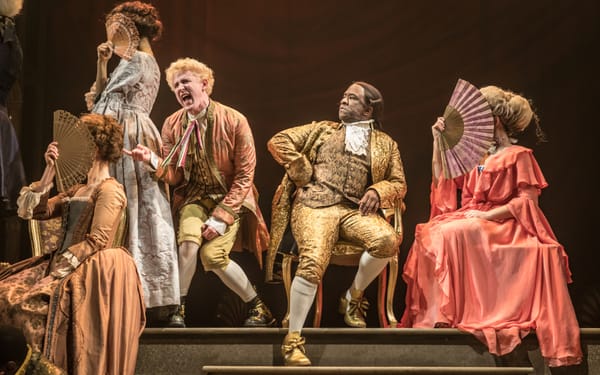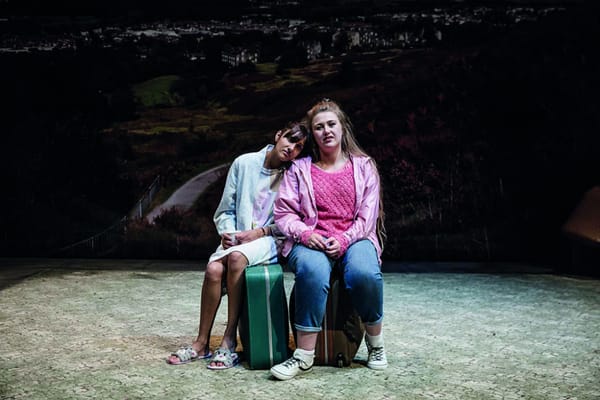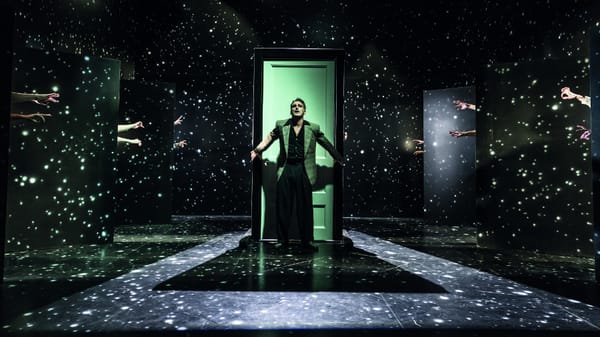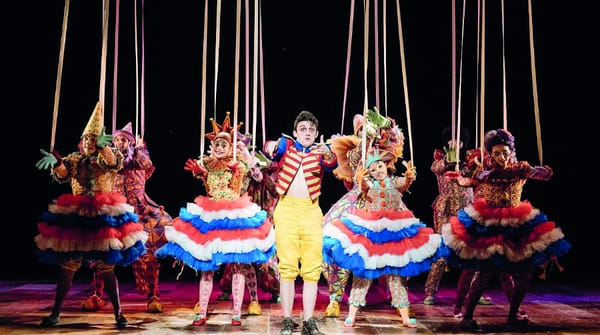Try a Little Tenderness: The Brothers Size at the Young Vic
Magical, lyrical, life-affirming – the revival of a tale of brotherly love by the writer of Moonlight is necessary viewing

Plays and movies don’t often get written about young, working class, black men; in the rare instances that they are the focus, the light in which they are shown can be less than flattering. Portrayals are often one-dimensional, heavy on aggression and toxic masculinity. In this landscape of facile stereotypes which are dismissive at best and openly racist at worst, playwright Tarell Alvin McCraney’s work is an oasis of richly layered, tender writing.
Much like Moonlight, for which McCraney won an Oscar last year, The Brothers Size explores the bonds between black men and the complexities of Southern masculinity. The play, back at the Young Vic after a decade, is steeped in allusions to Yoruba mythology. It follows two brothers in Louisiana. Oshoosi, who is younger, has just been released from the State Penitentiary and is living with his older brother whilst on parole. Ogun, named for the Yoruba god of hard labour, wants Oshoosi to clean up his act and get back into work. Straight-laced Ogun and happy-go-lucky Oshoosi clash as long-buried emotions rise to the surface, and the two attempt to negotiate the bittersweet path to reconciliation despite being haunted by Oshoosi’s time in prison. Entangled in this family tension is Oshoosi’s prison-mate and erstwhile lover, the charming Elegba, who Ogun does not trust.
From a relatively simple narrative of reunion McCraney weaves a script that feels Anne Carson-esque, on the cusp between poetry and prose. The naturalistic quickfire dialogue is peppered with lyrical monologues periodically, the characters slip into song, recalling memories that seem inextricably linked with the melodies. Unusually at times the actors pause to announce their stage directions. This is a consciously modernist approach and it takes some getting used to, but on the whole it works – adding comic flair to some scenes, and conjuring up a woozy, dream-like atmosphere in others.
“It would be easy for the play to fall apart, but the sheer charisma of the three leads make McCraney’s writing soar”
It is an arresting and often profound piece of writing, but a script as idiosyncratic as McCraney’s stands or falls on the skill of the actors. In director Bijan Sheibani’s production, there is nowhere to hide: there are no props, no scenery, and no stage. Encircled on all sides by the audience, the actors perform inside a white chalk circle. It would be easy for the play to fall apart, choked by its own intricacies, but the sheer blinding charisma of the three leads – Jonathan Ajayi, Sope Dirisu, and Anthony Welsh – make McCraney’s writing soar.
Sheibani, who was lauded for his work on The Barbershop Chronicles, along with choreographer Aline David, directs the trio to move together in sublime harmony. With lithe, muscular grace, they tumble, sway, and dance around each other, palms, arms, face becoming covered in scattered red chalk, all the while speaking in a Southern patois - at once colloquial and lyrical. Each delivers a performance that is emotionally resonant and seems deeply real. Jonathan Ajayi who is yet to leave stage school plays Oshoosi with deftness, his care-free facade cracking as the play progresses. Sope Dirisu is exceptional as Ogun: the scene in which he confronts Oshoosi for his selfishness, voice cracking as he absolves himself of the crushing responsibility he has felt for his young brother his whole life, is perhaps the most moving performance I’ve seen on the London stage.
“This is a play full of love and music, all of which serve to sharpen the anger”
“To be a Negro in this country and to be relatively conscious is to be in a rage almost all the time” James Baldwin wrote of the African American experience. The Brothers Size is a play brimming with anger – anger at poverty, at racism, at the prison-industrial complex that obstructs any meaningful rehabilitation. Where lesser playwrights might double down on heartbreak, McCraney is unafraid to let in the light – this is a play full of laughter, love and music, all of which sharpen the anger and poignancy.
In a minimalist production, music is the vehicle by which the stage is transformed from Ogun’s auto-shop in the oppressive Louisiana heat to empty motorways at night, chill with Gulf air. For the most part Manuel Pinheiro accompanies the actors with a steady thrum of percussion heavy with Yoruba beats. In one electrifying scene towards the end however, the drums stop and a slightly tinny recording of Try a Little Tenderness takes over as Ogun and Oshoosi sing along to the Otis Redding classic. Ogun chided for having an awful voice, mimes along to the instrumentals, sliding smoothly from keyboard to oboe, face beaming with joy as his younger brother croons out the chorus. It is a scene worthy of the sappiest romantic comedy, encapsulating the deep bond of love and childlike playfulness that remains between siblings even after hard times.
Packed into an unforgettable 90 minutes, this is a production that crackles with energy. In the days since I watched it, I haven’t been able to get it off my mind. January has barely ended but I’m pining my colours to the Young Vic’s revival: The Brothers Size is, and is very much likely to remain, the play of 2018.
5 Stars
Where? The Young Vic When? Until 13th February How Much? £10 - £38








